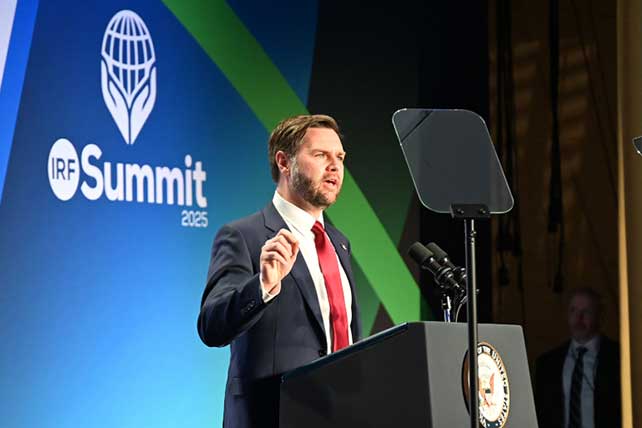Vance’s speech came the morning after Trump proposed that the U.S. “take over” the Gaza Strip and relocate Palestinians displaced by the Israel-Hamas war elsewhere, actions experts argue would violate international law.
Standing outside the ballroom shortly after the speech, Godfrey Yogarajah, World Evangelical Alliance’s ambassador of religious freedom, took issue with Vance’s remarks about atheism, saying in an interview, “Freedom of religion or belief also gives people a right not to believe.”
Yogarajah was also concerned about cuts and freezes to funding at USAID, arguing it will create a vacuum that could be filled by rivals of the U.S. that may have a different posture toward religious freedom.
“I think maybe the U.S. is just playing into the hands of China,” he said. “It is not in the interest of U.S. to really withdraw, because I would think that some of these values being out there actually is in the interest of the U.S.”
He was echoed by Mike Gabriel, head of the religious liberty commission at the National Christian Evangelical Alliance of Sri Lanka. Gabriel said that he was encouraged that Vance recommitted to advocating for religious freedom abroad, but that freezes on U.S. funds have already impacted his group.
“We work with U.S. government funds on advanced religious freedom in the country,” he said, later clarifying the funds come through USAID and go toward working with persecuted Christians in Sri Lanka. “Right now, because of the funding freeze, urgent support to document religious freedom violations, provide aid to persecuted Christians such as legal support for litigation, have come to a halt.”
Gabriel expressed hope that the funding would eventually be restored but described the current situation as “really unfortunate.”
In addition to ongoing lawsuits, Vance’s remarks speak to a series of clashes between faith groups and the new Trump administration over the past two weeks. After the Rt. Rev. Mariann Budde, the Episcopal bishop of Washington, pleaded with the president to “have mercy” on transgender children and immigrants in a sermon at the Washington National Cathedral, Trump decried her remarks as “nasty in tone” and dismissed the prelate as a “so-called bishop.”
A few days later, after the U.S. Conference of Catholic Bishops and other Catholic organizations issued statements condemning the president’s executive orders regarding immigrants and refugees, Vance himself questioned the motives of Catholic prelates, suggesting they were more concerned about their “bottom line” than helping the needy.
Trump has also all but frozen the U.S. refugee program and cut off funding to the seven religious groups that work with the government to resettle refugees — and, in at least one instance, is allegedly refusing to reimburse the groups for work done before Trump assumed office. The organizations staged a protest outside the White House on Tuesday, with leaders saying their staff has undergone widespread furloughs and layoffs in order to cobble together the resources needed to care for resettled refugees.
This article originally appeared here.

